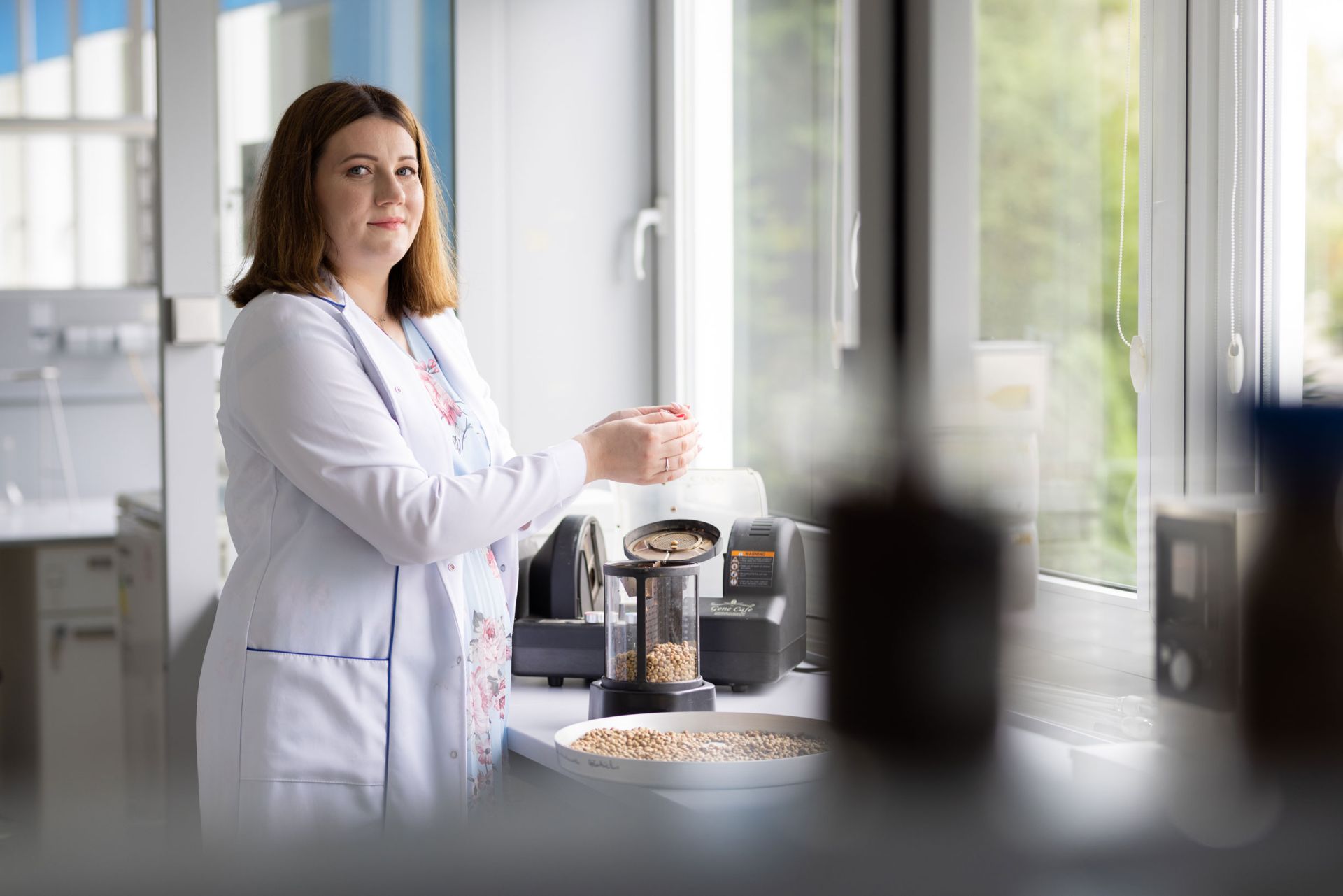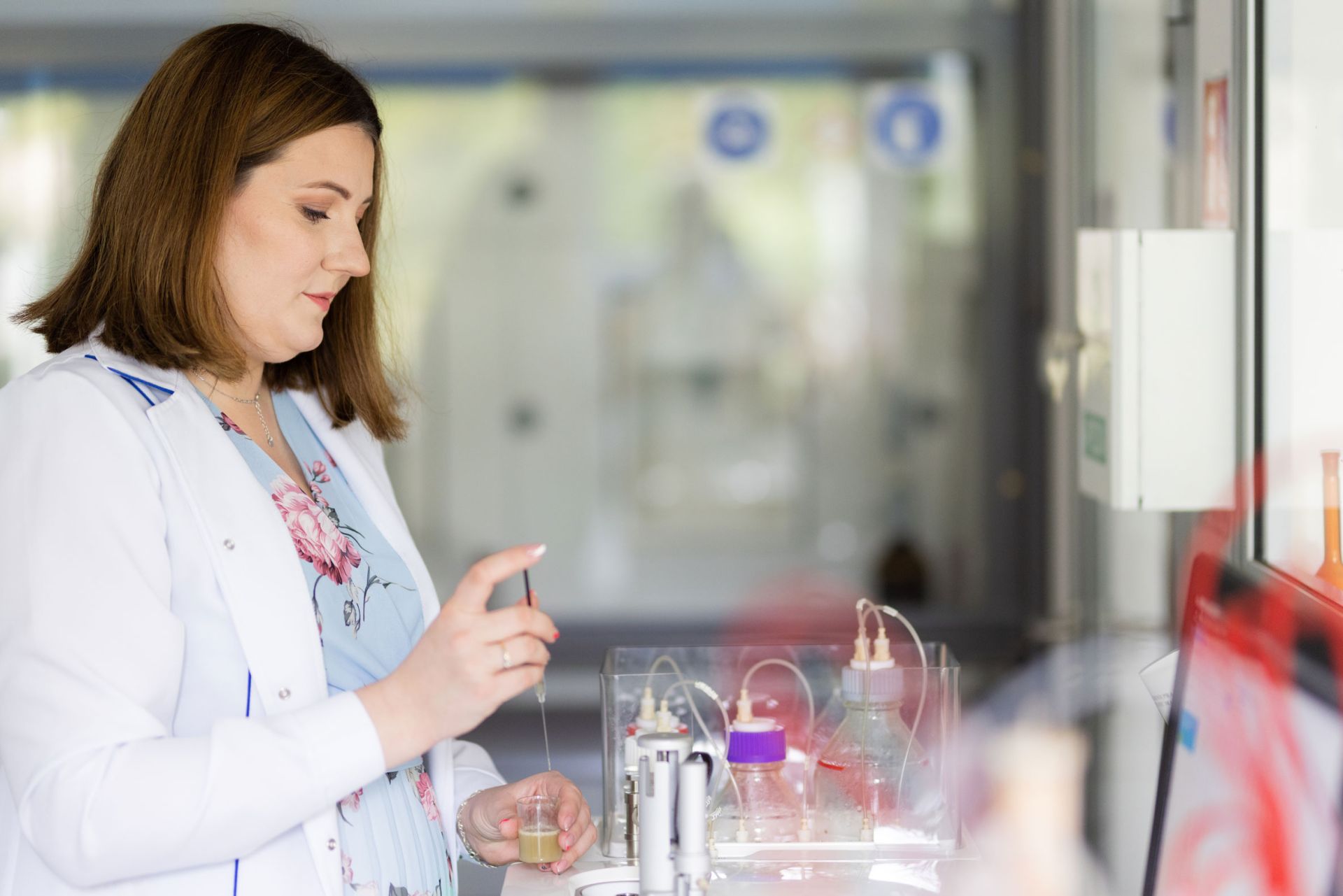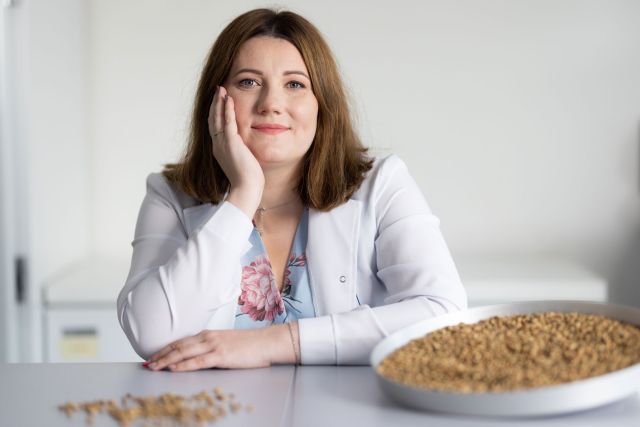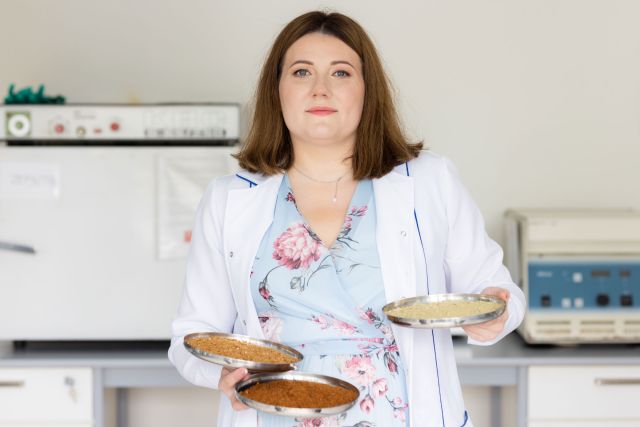Principal Investigator
:
Dr inż. Joanna Grzelczyk
Łódź University of Technology
Panel: NZ9
Funding scheme
: PRELUDIUM 15
announced on
15 March 2018
Multiple studies have demonstrated that roasted coffee seeds contain not only bioactive substances with an overall positive effect on health, but also potentially harmful compounds, such as 5-Hydroxymethylfurfural (5-HMF) and acrylamide (AM). On the other hand, the polyphenols found in coffee considerably limit the pathogenesis of many modern chronic lifestyle diseases. The main goal of the project was to assess the health-boosting properties of coffee ingredients on physico-chemical and cell line models; the purpose was to determine their physiologically achievable levels and impact on selected signalling pathways and, subsequently, identify the specific coffee extracts and fractions that show the greatest beneficial health effects when digested and absorbed in the gastrointestinal system.
 dr inż. Joanna Grzelczyk przy pracy, fot. Michał Łepecki
In order to achieve that objective, we prepared green, light- and dark-roasted coffee seed extracts from the Arabica and Robusta species and isolated fractions containing different polyphenol groups, free or bound with Maillard reaction products (MRP), as well as selected low-molecular MRPs, including AM and 5-HMF. These extracts and fractions were then subjected to in vitro enzymatic digestion with or without selected strains of probiotic lactic acid bacteria. We measured the absorption of polyphenols from the extracts or fractions in question in a model system consisting of a single layer of enterocytes, followed by the molecular modelling of these compounds via docking and calorimetric simulations, using body enzymes and receptors. The results of the modelling experiments were compared with cellular model assessments in order to confirm the activation of selected metabolic pathways in a more complex biological system. We identified the extracts and fractions that showed the greatest beneficial effect on cells after digestion and absorption and determined their most beneficial physiological concentrations, corresponding to specific coffee intake levels.
dr inż. Joanna Grzelczyk przy pracy, fot. Michał Łepecki
In order to achieve that objective, we prepared green, light- and dark-roasted coffee seed extracts from the Arabica and Robusta species and isolated fractions containing different polyphenol groups, free or bound with Maillard reaction products (MRP), as well as selected low-molecular MRPs, including AM and 5-HMF. These extracts and fractions were then subjected to in vitro enzymatic digestion with or without selected strains of probiotic lactic acid bacteria. We measured the absorption of polyphenols from the extracts or fractions in question in a model system consisting of a single layer of enterocytes, followed by the molecular modelling of these compounds via docking and calorimetric simulations, using body enzymes and receptors. The results of the modelling experiments were compared with cellular model assessments in order to confirm the activation of selected metabolic pathways in a more complex biological system. We identified the extracts and fractions that showed the greatest beneficial effect on cells after digestion and absorption and determined their most beneficial physiological concentrations, corresponding to specific coffee intake levels.
 dr inż. Joanna Grzelczyk przy pracy, fot. Michał Łepecki
The concentration of free polyphenols was observed to rise as they broke away from more complex structures, mainly in the large intestine, during the digestion of coffee extracts/fractions in the simulated GI tract. The presence of probiotic bacteria contributed to an increase in the levels of free polyphenols derived from chlorogenic acids, with high activity observed in the lower sections of the GI tract. Docking simulation studies of interactions and affinities with selected body enzymes and receptors showed that the latter created stable complexes with bioactive coffee compounds, with coffee ingredients competitively binding to enzyme/receptor active sites. When coffee extracts and fractions were digested in vitro, their affinity with enzymes/receptors, as analysed with the ITC method, increased in comparison with undigested material. This suggests that, when consumed, coffee extracts and fractions may effectively inhibit the activity of enzymes such as: acetylcholinesterase, butyrylcholinesterase, monoaminoxidase A, and topoisomerase II, or regulate the activity of the PPAR receptor. Among the samples studied in our in vitro research on cell lines, the highest bioactivity levels were observed for green coffee extracts, including chlorogenic acid fractions, which exhibited cytoprotective properties, protecting our model enterocytes (Caco-2 and HT29), nerve cells (SH-SY5Y), and pancreatic cells (MIN6) against the induced oxidative stress that contributes to carcinogenesis. They reduced the activity of cellular β-secretase, which may prevent the formation of β-amyloid plaque that damages nerve cells. Coffee ingredients were also observed to reduce the release of pro-inflammatory cytokines by differentiated adipocytes (3T3-L1) and stimulate GSIS, which may contribute to the maintenance of metabolic homeostasis. At the same time, elevated coffee compound levels induced cell death via apoptosis, which confirmed their anti-cancer properties.
dr inż. Joanna Grzelczyk przy pracy, fot. Michał Łepecki
The concentration of free polyphenols was observed to rise as they broke away from more complex structures, mainly in the large intestine, during the digestion of coffee extracts/fractions in the simulated GI tract. The presence of probiotic bacteria contributed to an increase in the levels of free polyphenols derived from chlorogenic acids, with high activity observed in the lower sections of the GI tract. Docking simulation studies of interactions and affinities with selected body enzymes and receptors showed that the latter created stable complexes with bioactive coffee compounds, with coffee ingredients competitively binding to enzyme/receptor active sites. When coffee extracts and fractions were digested in vitro, their affinity with enzymes/receptors, as analysed with the ITC method, increased in comparison with undigested material. This suggests that, when consumed, coffee extracts and fractions may effectively inhibit the activity of enzymes such as: acetylcholinesterase, butyrylcholinesterase, monoaminoxidase A, and topoisomerase II, or regulate the activity of the PPAR receptor. Among the samples studied in our in vitro research on cell lines, the highest bioactivity levels were observed for green coffee extracts, including chlorogenic acid fractions, which exhibited cytoprotective properties, protecting our model enterocytes (Caco-2 and HT29), nerve cells (SH-SY5Y), and pancreatic cells (MIN6) against the induced oxidative stress that contributes to carcinogenesis. They reduced the activity of cellular β-secretase, which may prevent the formation of β-amyloid plaque that damages nerve cells. Coffee ingredients were also observed to reduce the release of pro-inflammatory cytokines by differentiated adipocytes (3T3-L1) and stimulate GSIS, which may contribute to the maintenance of metabolic homeostasis. At the same time, elevated coffee compound levels induced cell death via apoptosis, which confirmed their anti-cancer properties.
Project title: Identifying the beneficial anti-neurodegenerative, anti-diabetes and anti-cancer effects of coffee seeds depending on seed roasting degree, species and intake level
Dr inż. Joanna Grzelczyk
In 2021, she defended her PhD cum laude at the Institute of Food Technology and Analysis of the Łódź University of Technology. She is a winner of Preludium 15 and the Polmos Żyrardów competition for the best PhD dissertation. She has also won a distinction in the “Mam pomysł na startup” competition. In 2019, she completed a research fellowship at the McGill University in Montreal, Canada. She is the author of a number of papers in international journals and co-author of one patent and several patent applications. She works as an Assistant Professor at the Institute of Food Technology and Analysis of the Łódź University of Technology.


